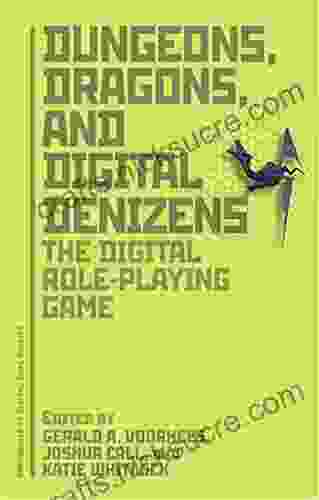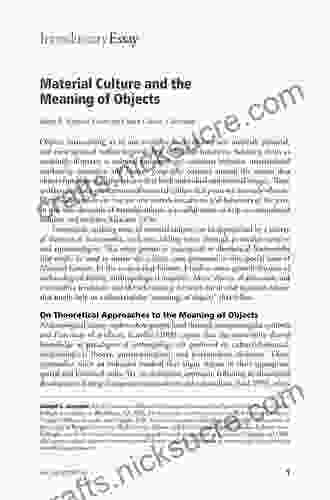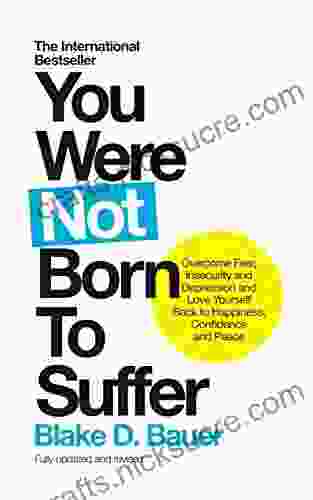Stiff: The Curious Lives of Human Cadavers

Mary Roach's 2003 book Stiff: The Curious Lives of Human Cadavers is a fascinating and informative look at the history of human dissection and the role that cadavers have played in our understanding of the human body.
4.6 out of 5
| Language | : | English |
| File size | : | 953 KB |
| Text-to-Speech | : | Enabled |
| Screen Reader | : | Supported |
| Enhanced typesetting | : | Enabled |
| Word Wise | : | Enabled |
| Print length | : | 304 pages |
Roach begins the book by describing her own experience as a medical student, dissecting a cadaver for the first time. She writes about the strange and wonderful things she learned about the human body, and about the respect she developed for the dead.
Roach then goes on to explore the history of human dissection, from the ancient Egyptians to the present day. She discusses the role that cadavers have played in the development of medicine, art, and crime. She also examines the ethical issues surrounding the use of cadavers, and the ways in which we can show respect for the dead.
Stiff is a well-written and engaging book that is sure to fascinate anyone who is interested in the human body, the history of medicine, or the ethics of death and dying.
The History of Human Dissection
The history of human dissection dates back to the ancient Egyptians. The Egyptians believed that the body was a temple, and that the soul would return to the body after death. As a result, they were very reluctant to dissect cadavers.
The Greeks were the first people to dissect cadavers on a regular basis. They believed that the body was a machine, and that it could be understood by studying its parts. The Greek physician Galen was one of the most famous anatomists of the ancient world. He dissected hundreds of cadavers, and his work was instrumental in the development of Western medicine.
The Romans continued the Greek tradition of anatomical dissection. The Roman physician Celsus wrote a book on anatomy that was used for centuries by medical students. The Roman physician Galen also wrote extensively on anatomy, and his work was instrumental in the development of Western medicine.
The Middle Ages saw a decline in anatomical dissection. The Church forbade the dissection of human cadavers, and as a result, medical knowledge stagnated.
The Renaissance saw a revival of anatomical dissection. The Italian anatomist Andreas Vesalius published a book on anatomy in 1543, which was based on his own dissections of cadavers. Vesalius's work was instrumental in the development of modern anatomy.
The Enlightenment saw a further increase in anatomical dissection. The French anatomist Bichat dissected hundreds of cadavers, and his work helped to establish the field of histology. The German anatomist Johann Friedrich Blumenbach dissected hundreds of cadavers, and his work helped to establish the field of anthropology.
The 19th century saw the development of new techniques for preserving cadavers. This made it possible to study cadavers for longer periods of time, and it led to a number of important discoveries in anatomy.
The 20th century saw the development of new imaging techniques, such as X-rays and MRI scans. These techniques have made it possible to study the human body in ways that were not possible before. As a result, our understanding of the human body has increased dramatically.
The Role of Cadavers in Science
Cadavers have played a vital role in the development of science. They have been used to study the human body, to test new medical treatments, and to develop new surgical techniques.
Cadavers have also been used in art. Artists have used cadavers to create sculptures, paintings, and drawings. Cadavers have also been used in crime. Criminologists have used cadavers to study the effects of different types of injuries, and to develop new forensic techniques.
The Ethical Issues Surrounding the Use of Cadavers
The use of cadavers raises a number of ethical issues. One issue is the question of consent. Can cadavers be used for research or education without the consent of the deceased? Another issue is the question of respect for the dead. How can we show respect for the dead while still using their bodies for scientific or educational purposes?
There are no easy answers to these questions. However, it is important to be aware of the ethical issues surrounding the use of cadavers, and to make sure that cadavers are treated with respect.
Stiff is a fascinating and informative look at the history of human dissection and the role that cadavers have played in our understanding of the human body. Roach writes with wit and compassion, and she provides a unique perspective on the ethical issues surrounding the use of cadavers.
4.6 out of 5
| Language | : | English |
| File size | : | 953 KB |
| Text-to-Speech | : | Enabled |
| Screen Reader | : | Supported |
| Enhanced typesetting | : | Enabled |
| Word Wise | : | Enabled |
| Print length | : | 304 pages |
Do you want to contribute by writing guest posts on this blog?
Please contact us and send us a resume of previous articles that you have written.
 Fiction
Fiction Non Fiction
Non Fiction Romance
Romance Mystery
Mystery Thriller
Thriller SciFi
SciFi Fantasy
Fantasy Horror
Horror Biography
Biography Selfhelp
Selfhelp Business
Business History
History Classics
Classics Poetry
Poetry Childrens
Childrens Young Adult
Young Adult Educational
Educational Cooking
Cooking Travel
Travel Lifestyle
Lifestyle Spirituality
Spirituality Health
Health Fitness
Fitness Technology
Technology Science
Science Arts
Arts Crafts
Crafts DIY
DIY Gardening
Gardening Petcare
Petcare Debbie Elicksen
Debbie Elicksen Steven Alan Childress
Steven Alan Childress Eze Ugbor
Eze Ugbor Randall Hyde
Randall Hyde T L Christianson
T L Christianson Glen Finland
Glen Finland Betsy Miller
Betsy Miller David Simon
David Simon Brian Greene
Brian Greene Garo Yepremian
Garo Yepremian Aaron Mahnke
Aaron Mahnke Adam Lazarus
Adam Lazarus Aaron Lee Johnson
Aaron Lee Johnson Ed Engle
Ed Engle Stephen Brennan
Stephen Brennan Adam J Rosh
Adam J Rosh Colin Hunter
Colin Hunter Louise Pickford
Louise Pickford Stephanie Puglisi
Stephanie Puglisi Christina Hoff Sommers
Christina Hoff Sommers Rob Gray
Rob Gray Ann Frederick
Ann Frederick Dan Werb
Dan Werb Tamora Pierce
Tamora Pierce Liza Angela
Liza Angela Richelle Mead
Richelle Mead James Heberd
James Heberd Caroline Kaufman
Caroline Kaufman Barbara Decker
Barbara Decker Adam J Cox
Adam J Cox Martha Gellhorn
Martha Gellhorn Kaylynn Flanders
Kaylynn Flanders Sally Clarkson
Sally Clarkson Dmv Test Bank
Dmv Test Bank Kenn Kaufman
Kenn Kaufman Achille Rubini
Achille Rubini Lillian Cumic
Lillian Cumic Shuai Huang
Shuai Huang Melodie M Davis
Melodie M Davis Charlie Barker
Charlie Barker Marc Dando
Marc Dando Goodman Publishing
Goodman Publishing Leigh Bardugo
Leigh Bardugo Sarah K L Wilson
Sarah K L Wilson Al Desetta
Al Desetta Sean Mcmanus
Sean Mcmanus Rachael Ray
Rachael Ray Charles Fernyhough
Charles Fernyhough Alan Robertson
Alan Robertson Norton Juster
Norton Juster Rose Ann Hudson
Rose Ann Hudson Al Yellon
Al Yellon Adam Chandler
Adam Chandler Mikki Daughtry
Mikki Daughtry Dan Shideler
Dan Shideler Kevin A Morrison
Kevin A Morrison Chuck Callaway
Chuck Callaway Shari Eskenas
Shari Eskenas Helen C Rountree
Helen C Rountree Gregor Clark
Gregor Clark Uri Bram
Uri Bram Aiden Thomas
Aiden Thomas Lisa M Schab
Lisa M Schab Lisa Robertson
Lisa Robertson Adam Lashinsky
Adam Lashinsky Adam Frank
Adam Frank Dawson Church
Dawson Church Jack Cavanaugh
Jack Cavanaugh Paula Deen
Paula Deen Laurence Steinberg
Laurence Steinberg Adam Benshea
Adam Benshea Jacob Neumann
Jacob Neumann Cassandra Eason
Cassandra Eason Dan Morris
Dan Morris Adam Kimelman
Adam Kimelman Christopher Knight
Christopher Knight David Winner
David Winner Allan Sand
Allan Sand Carley Roney
Carley Roney John Hancock
John Hancock Gil Capps
Gil Capps Andy Dumas
Andy Dumas Tim Jarvis
Tim Jarvis Maxine Levaren
Maxine Levaren Michael Egan
Michael Egan Meg Keys
Meg Keys Kit Bauman
Kit Bauman Elena Aguilar
Elena Aguilar Gavin D J Harper
Gavin D J Harper Stefan Ball
Stefan Ball Charles Thomas Jr
Charles Thomas Jr Chiara Giuliani
Chiara Giuliani Adam Galinsky
Adam Galinsky Michael L Bloomquist
Michael L Bloomquist Abigail Alling
Abigail Alling Pat Chargot
Pat Chargot Louise Thaden
Louise Thaden Abigail Tucker
Abigail Tucker Winston Chang
Winston Chang Vivian Gussin Paley
Vivian Gussin Paley Michael N Mitchell
Michael N Mitchell Ryan Smithson
Ryan Smithson Abraham Silberschatz
Abraham Silberschatz Claire Santry
Claire Santry Casey Robson
Casey Robson David Rensin
David Rensin Brandon Neice
Brandon Neice Zoyla Arana
Zoyla Arana Marvin Valerie Georgia
Marvin Valerie Georgia John D Gordon
John D Gordon Ronald Kaine
Ronald Kaine Kemi Iwalesin
Kemi Iwalesin Sam J Miller
Sam J Miller Stephen Abbott
Stephen Abbott Vivienne Sanders
Vivienne Sanders Moon Ho Jung
Moon Ho Jung Peter David
Peter David Kristin Berry
Kristin Berry Christophe Jaffrelot
Christophe Jaffrelot Jeremy Shinewald
Jeremy Shinewald Achusim Michael
Achusim Michael Chashiree M
Chashiree M Sheila Lamb
Sheila Lamb Larry Carpenter
Larry Carpenter Achref Hassini
Achref Hassini Carolyn Jessop
Carolyn Jessop Gladys Chepkirui Ngetich
Gladys Chepkirui Ngetich P S Page
P S Page Robert Fritz
Robert Fritz Andrew Campanella
Andrew Campanella Chris Jericho
Chris Jericho Harley Rustad
Harley Rustad Hillary Allen
Hillary Allen Timothy Phelps
Timothy Phelps J Robert King
J Robert King Vikas Kakwani
Vikas Kakwani Michael Johnson
Michael Johnson Tom Rosenbauer
Tom Rosenbauer Irene Lewis Mccormick
Irene Lewis Mccormick Jessie Hartland
Jessie Hartland Jon Butterworth
Jon Butterworth Ken Springer
Ken Springer Aaron Blight
Aaron Blight Chella Quint
Chella Quint Tom Migdalski
Tom Migdalski Anthony Wilkenson
Anthony Wilkenson Elisabetta Viggiani
Elisabetta Viggiani Cosmas Inyang
Cosmas Inyang Susan Walton
Susan Walton Peter Sagal
Peter Sagal Mary Wong
Mary Wong Cornel West
Cornel West Adam Freeman
Adam Freeman Catherine Ryan Hyde
Catherine Ryan Hyde Jeremy Paxman
Jeremy Paxman Katrina Kahler
Katrina Kahler Debbie Ford
Debbie Ford Sorin Dumitrascu
Sorin Dumitrascu Peter Harrison
Peter Harrison M J Parisian
M J Parisian Lynn Rush
Lynn Rush Ada Calhoun
Ada Calhoun Lisa Pineda
Lisa Pineda Adam Braus
Adam Braus Daphne Poltz
Daphne Poltz Thomas Wilson
Thomas Wilson Megan Lane
Megan Lane Gisle Solhaug
Gisle Solhaug Aaron Mccargo
Aaron Mccargo Steve Griffith
Steve Griffith Sarah Luddington
Sarah Luddington Monica Sorrenson
Monica Sorrenson Carl Jones
Carl Jones Collins Kids
Collins Kids Michelle Hodkin
Michelle Hodkin Ralph Villiger
Ralph Villiger Jennifer Finney Boylan
Jennifer Finney Boylan Douglas W Hubbard
Douglas W Hubbard Curt Lader
Curt Lader Barbara A Lewis
Barbara A Lewis Man Kam Lo
Man Kam Lo Og Mandino
Og Mandino Jason Korol
Jason Korol Lucy Letcher
Lucy Letcher Abigail Hair
Abigail Hair Asato Asato
Asato Asato Walter Browder
Walter Browder Kim Gosselin
Kim Gosselin Ben Cohen
Ben Cohen Stephen Gray
Stephen Gray Vince Kotchian
Vince Kotchian Jay Dawes
Jay Dawes Barry Robinson
Barry Robinson Judi Kesselman Turkel
Judi Kesselman Turkel Sam Jarman
Sam Jarman Emily Suzanne Clark
Emily Suzanne Clark T L Lowery
T L Lowery Emily J Taylor
Emily J Taylor Beth Newell
Beth Newell Teresa Finney
Teresa Finney Alexander Nehamas
Alexander Nehamas Tali Edut
Tali Edut William Deresiewicz
William Deresiewicz Jim Willis
Jim Willis Jeff Bauman
Jeff Bauman Devika Primic
Devika Primic Richard Langer
Richard Langer Bruce Van Brunt
Bruce Van Brunt Roman Dial
Roman Dial Christopher S Stewart
Christopher S Stewart Aaron Oster
Aaron Oster Neil Oliver
Neil Oliver Kirk Bailey
Kirk Bailey Lynn E Ponton
Lynn E Ponton Laurie Chaikind Mcnulty Lcsw C
Laurie Chaikind Mcnulty Lcsw C Laura Sebastian
Laura Sebastian Richard Sattora
Richard Sattora Abigail Pogrebin
Abigail Pogrebin Gloria Atanmo
Gloria Atanmo Abby Hafer
Abby Hafer John Taylor
John Taylor Rory Miller
Rory Miller Erik Scott De Bie
Erik Scott De Bie Laura Peyton Roberts
Laura Peyton Roberts Rosie Pope
Rosie Pope Amelia Whitmore
Amelia Whitmore Christopher Pike
Christopher Pike Sheri Van Dijk
Sheri Van Dijk Abridged Ed Edition Kindle Edition
Abridged Ed Edition Kindle Edition Aliza Green
Aliza Green Phong Thong Dang
Phong Thong Dang Suzanne Corkin
Suzanne Corkin Fumio Sasaki
Fumio Sasaki Rolf Mowatt Larssen
Rolf Mowatt Larssen Scott Shaw
Scott Shaw Agustin Fuentes
Agustin Fuentes Alicia Silverstone
Alicia Silverstone Barbara Fox
Barbara Fox Chaz Scoggins
Chaz Scoggins Zoe Hamlet Silva
Zoe Hamlet Silva Tim Larkin
Tim Larkin Lenyfer Garrido
Lenyfer Garrido Tony Soper
Tony Soper Fred Fields
Fred Fields Linda Sarris
Linda Sarris Laura Gao
Laura Gao Phil Gaimon
Phil Gaimon Seth Kugel
Seth Kugel Reinette Biggs
Reinette Biggs Arthur Turrell
Arthur Turrell Barry Dainton
Barry Dainton Scott Carney
Scott Carney Abby Haight
Abby Haight Martha C Nussbaum
Martha C Nussbaum Mark Strom
Mark Strom Kel Carpenter
Kel Carpenter Adam Becker
Adam Becker Papus
Papus Brian Hoggard
Brian Hoggard Scott Butler
Scott Butler Christopher Black
Christopher Black John Kean
John Kean Drew Harris
Drew Harris Virginia Smith Harvey
Virginia Smith Harvey Abbey Curran
Abbey Curran Paul Mclerran
Paul Mclerran Paul Schneider
Paul Schneider Jack Moore
Jack Moore Michael Gruenbaum
Michael Gruenbaum Jenny Han
Jenny Han Aaron Hahn
Aaron Hahn Stephanie Zeiss
Stephanie Zeiss Kayla Cottingham
Kayla Cottingham James Surowiecki
James Surowiecki Lucio Russo
Lucio Russo Ron Hotchkiss
Ron Hotchkiss Lin Wellford
Lin Wellford Brigitte Jordan
Brigitte Jordan Heather Lynn
Heather Lynn Genius Reads
Genius Reads Adam D Scott
Adam D Scott Eugene H Merrill
Eugene H Merrill Rex Ogle
Rex Ogle Emily K Neuburger
Emily K Neuburger Jennifer Ackerman
Jennifer Ackerman Jennifer L Hunt
Jennifer L Hunt David Lipsky
David Lipsky Christian Beamish
Christian Beamish Clara Shaper
Clara Shaper Abigail Owen
Abigail Owen David Feddes
David Feddes Conrad Bauer
Conrad Bauer Edward J Larson
Edward J Larson Sophie Mccartney
Sophie Mccartney Joe Simpson
Joe Simpson Jennifer Greene
Jennifer Greene Abhishek V R
Abhishek V R Gerry Donohue
Gerry Donohue Rick Sekuloski
Rick Sekuloski Alvin Alexander
Alvin Alexander E P Marcellin
E P Marcellin Jessica Hepburn
Jessica Hepburn Matt Owens
Matt Owens Bill Loguidice
Bill Loguidice Marie Cirano
Marie Cirano Annie Nicholas
Annie Nicholas Michel Roy
Michel Roy Charles C Patrick
Charles C Patrick Bill Mckibben
Bill Mckibben Gayle Forman
Gayle Forman Randi Hutter Epstein
Randi Hutter Epstein Scott Meyers
Scott Meyers Jeremy Miles
Jeremy Miles Axie Oh
Axie Oh Wayne Westcott
Wayne Westcott Carmen Moreno
Carmen Moreno Andrew Skurka
Andrew Skurka Ned Johnson
Ned Johnson Lisa Latimer
Lisa Latimer Andy Couturier
Andy Couturier Lindsey Ellison
Lindsey Ellison Sherri Granato
Sherri Granato George John Romanes
George John Romanes Sarah Maslin Nir
Sarah Maslin Nir Stephen A Mitchell
Stephen A Mitchell Craig Timberg
Craig Timberg George J Hademenos
George J Hademenos Claire Ahn
Claire Ahn Lois G Schwoerer
Lois G Schwoerer Farah Shabazz Ii
Farah Shabazz Ii Jasna Tuta
Jasna Tuta Miranda Kenneally
Miranda Kenneally Brad Brewer
Brad Brewer Stuart Firestein
Stuart Firestein Natasha Preston
Natasha Preston Terry Palechuk
Terry Palechuk Jennifer Shannon
Jennifer Shannon Chris Worfolk
Chris Worfolk Alifya And Umesh Mohite
Alifya And Umesh Mohite Programming Languages Academy
Programming Languages Academy Amber Domoradzki
Amber Domoradzki An American Citizen
An American Citizen Jay Ruud
Jay Ruud Abbas Kazerooni
Abbas Kazerooni Richard Lighthouse
Richard Lighthouse David Warriner
David Warriner Ian Davis
Ian Davis William Hamilton Gibson
William Hamilton Gibson Abby Sunderland
Abby Sunderland Stacy Eaton
Stacy Eaton Miriam Forman Brunell
Miriam Forman Brunell Abinash Das
Abinash Das Mary Roach
Mary Roach Hans C Ohanian
Hans C Ohanian Shannon Hale
Shannon Hale Abu Mussab Wajdi Akkari
Abu Mussab Wajdi Akkari Andrea M Nelson Royes
Andrea M Nelson Royes Al Baird
Al Baird Jim Morekis
Jim Morekis Abdul Foster
Abdul Foster Irakli Makharadze
Irakli Makharadze Stephen R Lawhead
Stephen R Lawhead David G Brown
David G Brown Iain Highfield
Iain Highfield Amber Fox
Amber Fox Blake D Bauer
Blake D Bauer Todd Graves
Todd Graves Darrin Bergman
Darrin Bergman Adam Enaz
Adam Enaz Deborah Madison
Deborah Madison Charles L Byrne
Charles L Byrne Gary Sakuma
Gary Sakuma Ken Retallic
Ken Retallic Susan Zeppieri
Susan Zeppieri Adam Koch
Adam Koch Sharon Boyd
Sharon Boyd Lisa Heffernan
Lisa Heffernan Justin Driver
Justin Driver Kate Rope
Kate Rope Domenica Marchetti
Domenica Marchetti Tomos Forrest
Tomos Forrest Ariana Eagleton
Ariana Eagleton Paul Chiasson
Paul Chiasson Erika Fatland
Erika Fatland Sheldon Axler
Sheldon Axler Christopher Monahan
Christopher Monahan Linford Stutzman
Linford Stutzman Matt Warshaw
Matt Warshaw Adam Boduch
Adam Boduch Lee Sandlin
Lee Sandlin Al Barkow
Al Barkow Robert Reid
Robert Reid O Thomas Gift
O Thomas Gift Steve Mcmenamin
Steve Mcmenamin Tom Jackson
Tom Jackson Benjamin Roberts
Benjamin Roberts Gerald A Voorhees
Gerald A Voorhees Tomi Adeyemi
Tomi Adeyemi Abigail Melton
Abigail Melton Jimmy Houston
Jimmy Houston Xiuhtezcatl Martinez
Xiuhtezcatl Martinez Helen Scales
Helen Scales Lynn Alley
Lynn Alley Carl Vernon
Carl Vernon Richard Martin
Richard Martin Maya Lang
Maya Lang Katie Lear
Katie Lear Aaron Graves
Aaron Graves Brian L Gorman
Brian L Gorman Abigail Hing Wen
Abigail Hing Wen Ian Mcleod
Ian Mcleod Nick Holt
Nick Holt Adam H Balen
Adam H Balen Sarah Moore
Sarah Moore Michelle Obama
Michelle Obama Achim K Krull
Achim K Krull Joy Neighbors
Joy Neighbors Gail Buckland
Gail Buckland Emma Crewe
Emma Crewe Sissy Goff
Sissy Goff Alicia C Simpson
Alicia C Simpson Scott Parsons
Scott Parsons Steve Roper
Steve Roper Felice Fox
Felice Fox Aaron Reed
Aaron Reed Sean Lewis
Sean Lewis Barbara Natterson Horowitz
Barbara Natterson Horowitz Bathroom Readers Institute
Bathroom Readers Institute Rania Abouzeid
Rania Abouzeid Charles H Kraft
Charles H Kraft Jane Gross
Jane Gross Abby Mcallister
Abby Mcallister Kathy Koch Phd
Kathy Koch Phd Tom Mccarthy
Tom Mccarthy Lavinia Collins
Lavinia Collins Aaron Reed Msn Crna
Aaron Reed Msn Crna Pamela Druckerman
Pamela Druckerman Robert Allans
Robert Allans Ron Jones
Ron Jones Randy Walker
Randy Walker G Bailey
G Bailey Jeremy Roenick
Jeremy Roenick Dr Robert Pasahow
Dr Robert Pasahow Ann Mariah Cook
Ann Mariah Cook Abbi Glines
Abbi Glines John Caig
John Caig Winifred Conkling
Winifred Conkling Israel Finkelstein
Israel Finkelstein Aaron J Perry
Aaron J Perry Nancy Mohrbacher
Nancy Mohrbacher Steve Rosenberg
Steve Rosenberg Bobby Reyes
Bobby Reyes Michael Crawley
Michael Crawley Amby Burfoot
Amby Burfoot Laura Ray
Laura Ray Maureen Duffin Ward
Maureen Duffin Ward Taylan Hoca
Taylan Hoca Aaron James
Aaron James Baba Ifa Karade
Baba Ifa Karade Mark Januszewski
Mark Januszewski Dick Edie
Dick Edie Ilsa J Bick
Ilsa J Bick Garrett Mcnamara
Garrett Mcnamara Daniel Carter Beard
Daniel Carter Beard Eduardo Duran
Eduardo Duran Lisa M Given
Lisa M Given Sasha Abramsky
Sasha Abramsky Phil Boyle
Phil Boyle Renda Dionne Madrigal
Renda Dionne Madrigal R L Stine
R L Stine Marlene Wagman Geller
Marlene Wagman Geller Horace Kephart
Horace Kephart Abigail Marshall
Abigail Marshall Michael Baigent
Michael Baigent Abdelkader Nouiri
Abdelkader Nouiri Pearson Education
Pearson Education Deborah Beck Busis
Deborah Beck Busis Thubten Yeshe
Thubten Yeshe Arthur Atchabahian
Arthur Atchabahian Corinne Andrews
Corinne Andrews Rachel Caine
Rachel Caine
Light bulbAdvertise smarter! Our strategic ad space ensures maximum exposure. Reserve your spot today!
 Gregory WoodsFollow ·5.3k
Gregory WoodsFollow ·5.3k Andy ColeFollow ·8.5k
Andy ColeFollow ·8.5k Tyler NelsonFollow ·13.9k
Tyler NelsonFollow ·13.9k F. Scott FitzgeraldFollow ·19.5k
F. Scott FitzgeraldFollow ·19.5k Roland HayesFollow ·18.6k
Roland HayesFollow ·18.6k Owen SimmonsFollow ·12.7k
Owen SimmonsFollow ·12.7k Jessie CoxFollow ·19.4k
Jessie CoxFollow ·19.4k David BaldacciFollow ·12.1k
David BaldacciFollow ·12.1k

 Doug Price
Doug PriceTracing the Evolution of Modern Psychoanalytic Thought:...
Psychoanalysis, once considered a radical...

 Devin Ross
Devin RossThe Digital Role Playing Game Approaches To Digital Game...
These are just a few of the many...

 F. Scott Fitzgerald
F. Scott FitzgeraldHistory from Things: Essays on Material Culture
History from Things:...

 Percy Bysshe Shelley
Percy Bysshe ShelleyThe Priest Lake Girl and the Cabin of Love: A True Story...
The Murder On...

 Isaiah Powell
Isaiah PowellThe Golf Mystic: Dick Edie's Unconventional Approach to...
In the annals of golf history, the name Dick...
4.6 out of 5
| Language | : | English |
| File size | : | 953 KB |
| Text-to-Speech | : | Enabled |
| Screen Reader | : | Supported |
| Enhanced typesetting | : | Enabled |
| Word Wise | : | Enabled |
| Print length | : | 304 pages |














